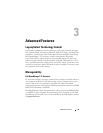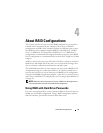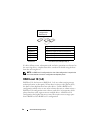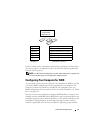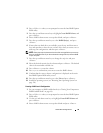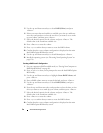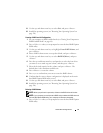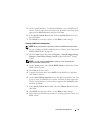
46 About RAID Configurations
If a drive failure occurs, subsequent read and write operations are directed to
the surviving drives. A replacement drive can then be rebuilt using the data
from the surviving drives.
NOTE: In a RAID level 5 configuration, the size of the configuration is equal to the
size of the smallest drive in the configuration multiplied by three.
RAID Level 10 (1+0)
RAID level 10, also known as RAID level 1+0, uses a data-staging storage
technique known as data parity. When data is written to the primary drive,
the data is then duplicated on four other drives. Unlike a RAID level 1
configuration which writes to one other volume that acts as a data mirror, a
RAID level 10 configuration writes data to each drive in increments which
places data from each segment across multiple drives. A RAID level 10
configuration has higher data access rates but requires more storage space
than a RAID level 0 or RAID level 1 configuration.
hard drive 1
segment 1
segment 2
segment 3
hard drives 2, 3 (and optionally, 4)
segment 4
segment 5
segment 6
segment 1 striped across at least 3 drives
segment 2 striped across at least 3 drives
segment 3 striped across at least 3 drives
segment 4 striped across at least 3 drives
segment 5 striped across at least 3 drives
segment 6 striped across at least 3 drives
serial ATA RAID
configured for
RAID level 5




